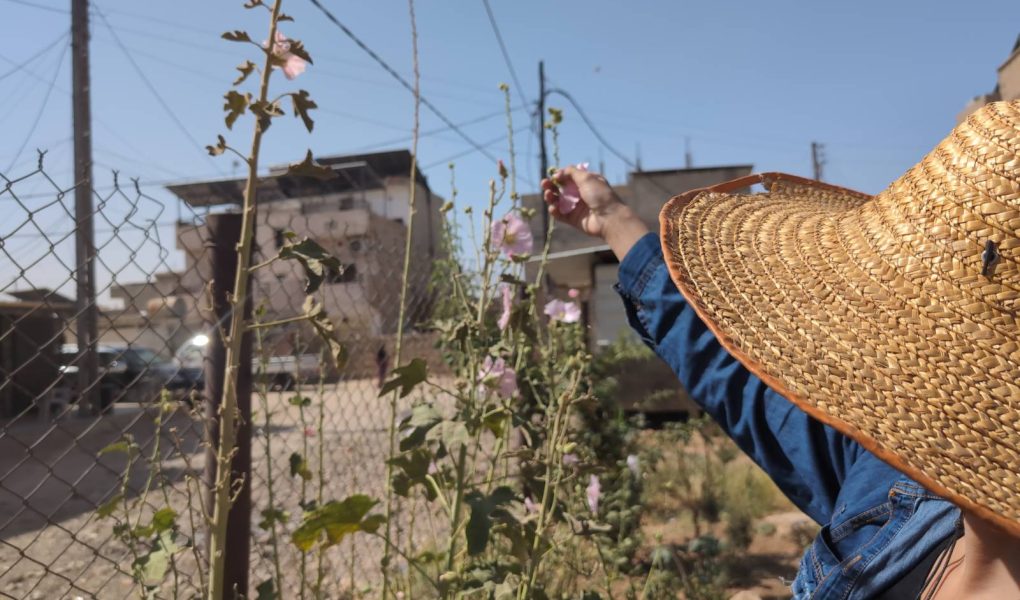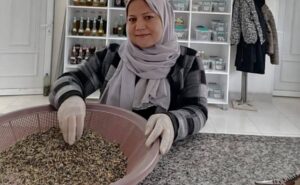It is summer: Harvest time. Here at the Navenda Jiyan Natural Health Center, seeds are collected every day. Plants are watered, bees are fed, potatoes are harvested, and flowers and leaves are diligently picked. The results of this laborious work are gathered in the drying room, where they slowly dried to be used later for medicinal purposes by the Centre. Other items are processed directly into oil or distilled: to extract their valuable ingredients.

Everything that is left over is later used as compost to strengthen the plants outside, because here, nothing is simply waste—and everything is used. Most of the people working here are women, due to their natural connection to nature. One of the women working here explains: “Women are strongly connected to nature and society; they are the ones who build, organize, and defend life. As women, we feel that plants are part of us, and we work and live accordingly.”
The Center opened in Qamişlo in 2022, inspired by the ideas of Abdullah Öcalan and as part of the Autonomous Administration of North and East Syria and the Kurdish women’s movement. Research into natural medicine began years earlier, and a great deal of experience and knowledge has been gathered, tested, and applied.

Often, knowledge about the healing properties of plants lies hidden within society. Patients here often come back to share new knowledge, or to express their surprise at what plants can be used for beyond the kitchen. International visitors are also constantly amazed at what is more than just weeds in their garden (at home). For example, dandelions and chicory contain valuable ingredients, but this knowledge has been lost in many parts of the world.
Outside is the heart of the Center. Here, the work revolves around the plants and the garden, which is lovingly tended with great care. People are at the service of the plants, which marks a new relationship with nature being established. The more effort and love that is put into the plants, the more they can be used for medicine. However, it is not about producing something, but rather about building a new life in a very practical way. The love for the plants is not based on anything artificial. It is based on a love for life and nature. Abdullah Öcalan’s ideas are put into practice here in an attempt to a new ecological way – a life in balance between humans and nature. Jasmin, an internationalist, says that: “Experiencing the women’s revolution here is something very beautiful and meaningful. The natural relationship between women and nature is evident here through the natural love of life. And at the same time, there is nothing more beautiful than putting your hands in the earth, feeling the plants, and nurturing the seeds of revolution.”
So while seeds grow, bloom, and dry outside, inside: medicine is produced. The rooms are filled with the results of everyone’s work. Capsules are produced, oil is bottled, and creams and ointments are made. Almost everything here is made from the Centre’s own garden. In addition to production of medicine here, sick people also visit the center. They are treated in the next room.

The medicine produced is mainly used for internal ailments: for everything except the heart and eyes. Unlike in Europe, more than just the painful area is treated, because the body functions holistically and so too does the medicine that is given.
A holistic view of the body helps to strengthen and defend it against disease. The body is understood as best able to help itself: and that medicine should help to support it in doing so. Since everything comes from nature, the body can accept the medicine well, and does not see it as something foreign. In addition to administering medicine; the work of helping people to understand their own bodies is also understood as important work here. As well as providing medicine, the illness and the effects of the medicinal plant are discussed, massages are given, exercises are demonstrated, and nutrition is discussed, with patients.
As a result, naturopathy is recognized in society and people come throughout the day to be treated or simply to ask questions and discuss. Here, people are taught that nature is close to them, and their consciousness is changed. Navenda Jiyan literally means the center of life. This is because it is the place where life begins with nature – and where change for a new life also begins.



